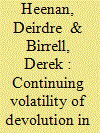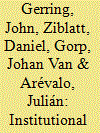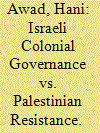| Srl | Item |
| 1 |
ID:
155419


|
|
|
|
|
| Summary/Abstract |
Since the establishment of devolution in 1999, Northern Ireland's power-sharing governments have been fragile and prone to crisis. However, following a decade of relative stability and cooperation between Nationalists and Unionists at Stormont, hopes were high that the devolved arrangements had finally become embedded and more resistant to collapse. This optimism was dashed when Sinn Féin brought down the devolved institutions in January 2017. A snap election once again returned the Democratic Unionist Party (DUP) and Sinn Féin as the largest parties and their inability to form a government resulted in yet another political stalemate. This article begins by outlining the pattern of political crises in Northern Ireland and assesses both the trigger factors and the responses. It then goes beyond the most obvious explanation for this continuing instability—that of the deep sectarian based divisions—and points to a number of other reasons for the volatility. These include issues such as the incomplete implementation of previous agreements, the impact of broader UK policies and the shadow of Direct Rule.
|
|
|
|
|
|
|
|
|
|
|
|
|
|
|
|
| 2 |
ID:
106331


|
|
|
|
|
| Publication |
2011.
|
| Summary/Abstract |
Most governance arrangements involve spatial units with highly unequal powers, for example, a feudal monarchy and its principalities, an empire and its colonies, a formal empire and an informal empire (or sphere of influence), a national government and its subnational entities, or a regional government and its local entities. In this situation, the dominant unit (A) usually enjoys some discretion about how to institutionalize its authority over the subordinate unit (B). An important element of this decision concerns how much authority should be delegated to the weaker unit. The authors simplify this dimension of governance along a continuum of "direct" and "indirect" styles of rule. Why, in some cases, does one find a relatively direct (centralized) system of rule and in others a relatively indirect (decentralized) system of rule? While many factors impinge on this decision, the authors argue that an important and highly persistent factor is the prior level of centralization existing within the subordinate unit. Greater centralization in B is likely to lead to a more indirect form of rule between A and B, all other things being equal. The authors refer to this as an institutional theory of direct/indirect rule. Empirical analyses of this hypothesis are applied to patterns of direct and indirect rule (1) during the age of imperialism and (2) across contemporary nation-states. The article concludes by discussing applications of the theory in a variety of additional settings.
|
|
|
|
|
|
|
|
|
|
|
|
|
|
|
|
| 3 |
ID:
192248


|
|
|
|
|
| Summary/Abstract |
This article examines the institutional genealogy of Israeli colonial governance (ICG) and the accompanying patterns of Palestinian resistance in the occupied West Bank and Gaza Strip. It argues that ICG has experienced three phases, each marked by a particular form of direct or indirect colonial rule. Each of these colonial rule forms has been resisted through a distinct pattern of centralized or decentralized collective political agency. I argue that both the form and governing logic of ICG are determined not only by colonialist aims, but also by their interplay with the Palestinian resistance.
|
|
|
|
|
|
|
|
|
|
|
|
|
|
|
|